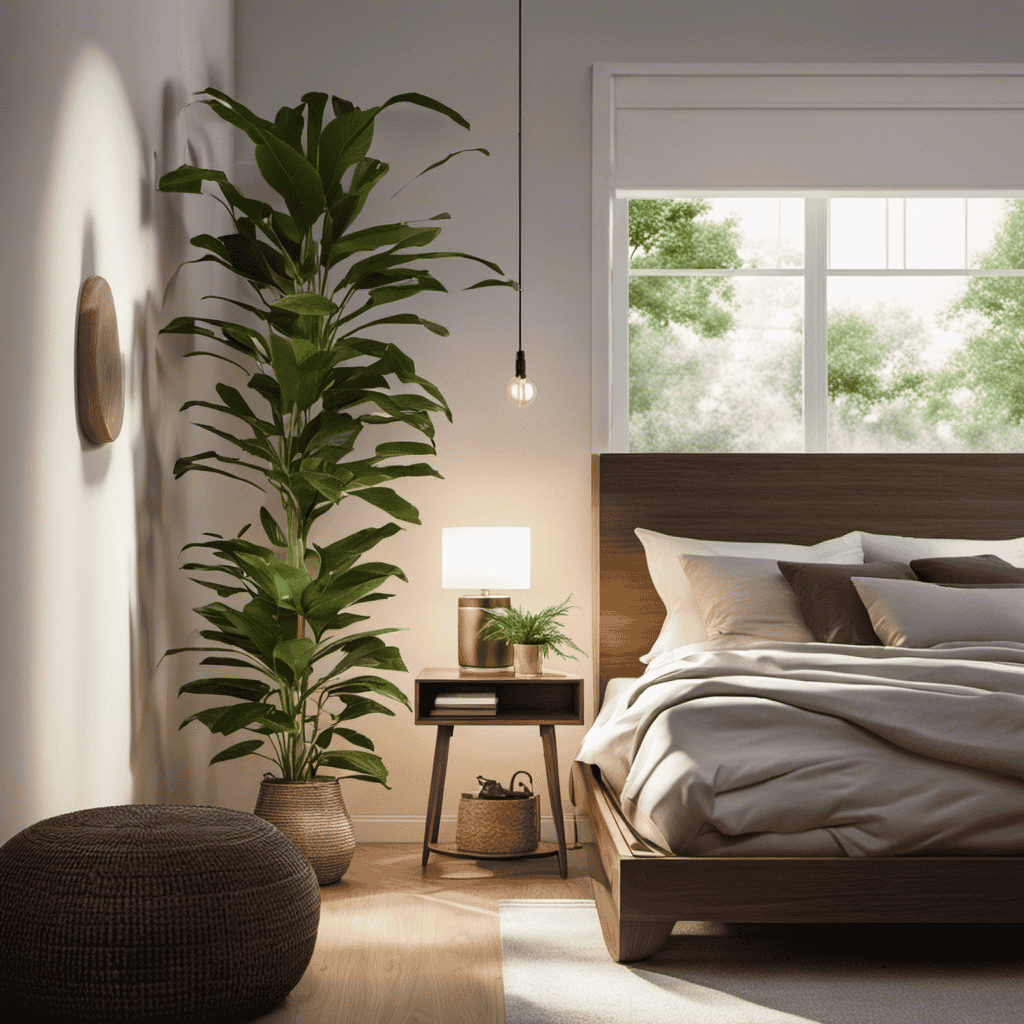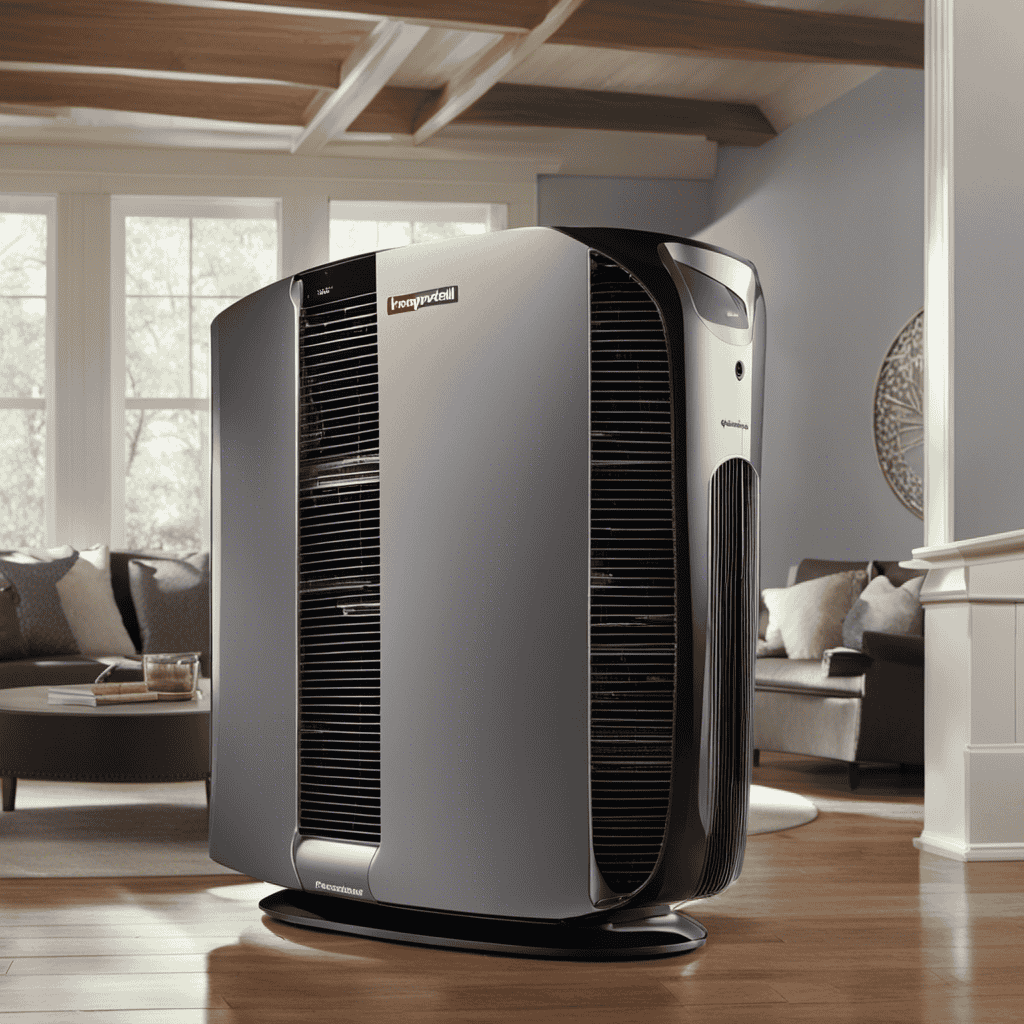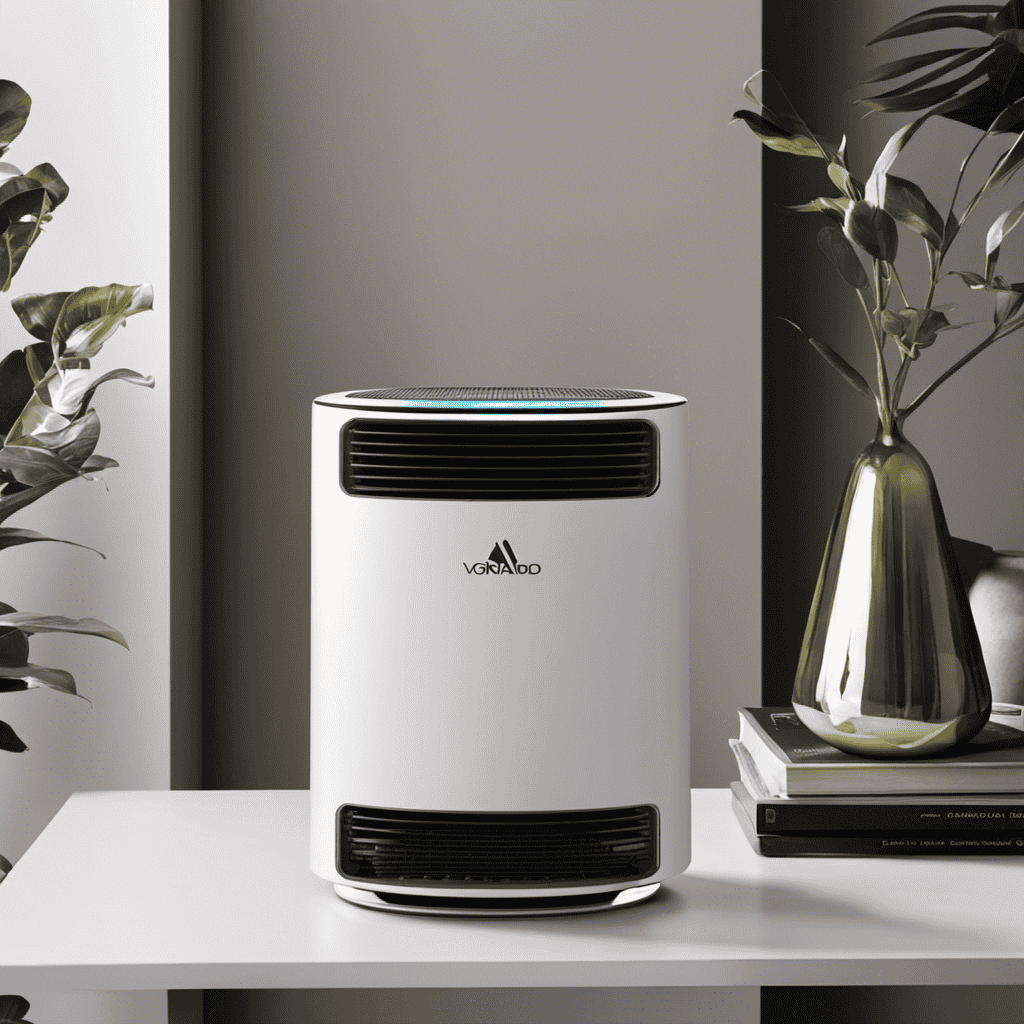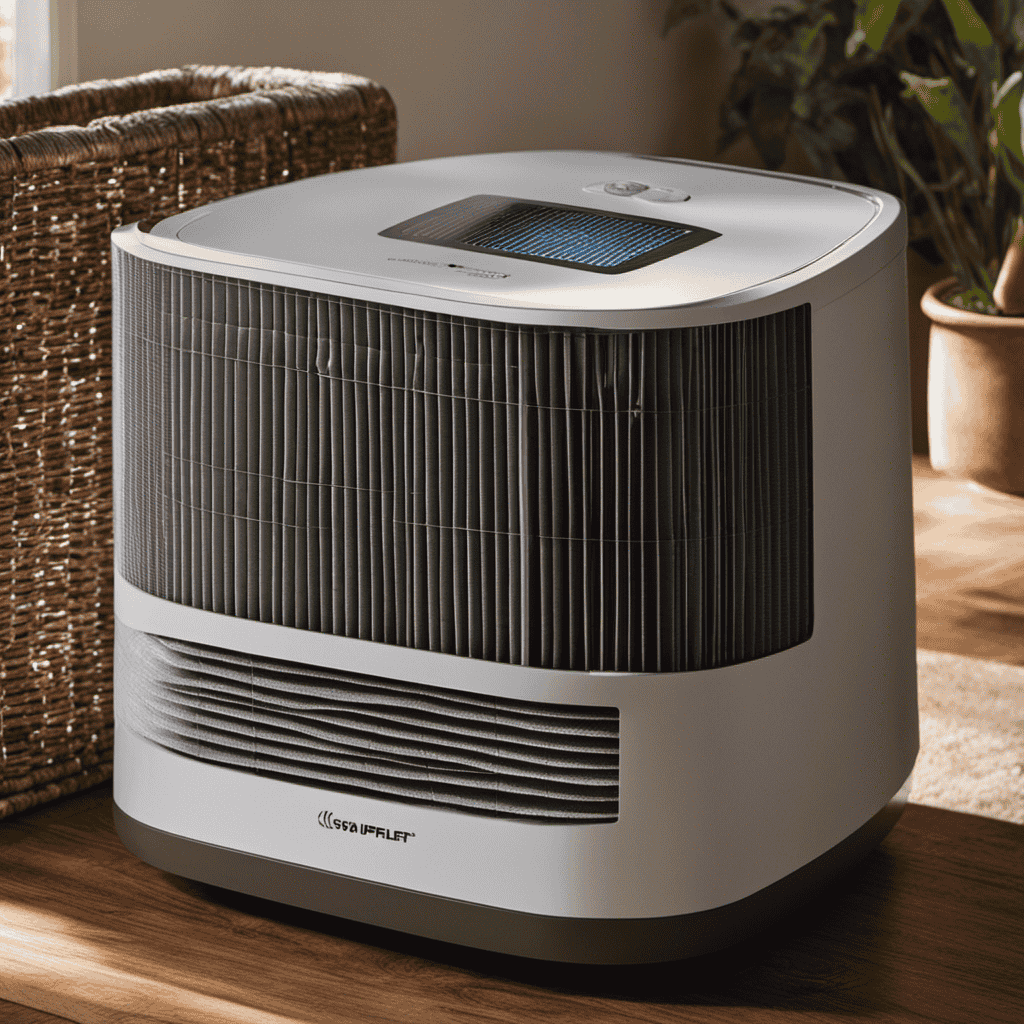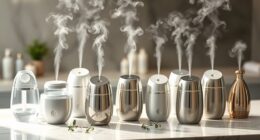As an individual with asthma, I have frequently pondered whether an air purifier could assist in reducing my symptoms. And the answer is a definite yes!
Air purifiers work by filtering out the triggers that can worsen asthma, such as dust, pollen, and pet dander. Not only can they improve the air quality in your home, but they can also provide much-needed relief from wheezing, coughing, and shortness of breath.
In this article, we’ll explore the benefits of using an air purifier for asthma management and provide tips on choosing the right one for your needs.
Key Takeaways
- Air purifiers effectively filter out airborne particles and allergens that can trigger asthma symptoms.
- Using an air purifier can reduce the frequency and severity of asthma attacks.
- Improved indoor air quality promotes better respiratory health.
- Managing asthma symptoms may reduce the need for medication.
Understanding Asthma: Causes and Triggers
Understanding asthma and its causes is crucial for managing the condition effectively. Asthma is a chronic respiratory disease characterized by inflammation and narrowing of the airways, leading to symptoms such as wheezing, coughing, shortness of breath, and chest tightness.
There are various factors that can trigger asthma symptoms, including allergens (such as pollen, dust mites, and pet dander), respiratory infections, exercise, and exposure to irritants like smoke and air pollution.
Prevention plays a key role in managing asthma. It involves identifying and avoiding triggers that can worsen symptoms. This may include maintaining a clean and dust-free environment, using dust mite-proof bedding covers, avoiding exposure to tobacco smoke, and practicing good hand hygiene to prevent respiratory infections.
In addition to prevention, there are various treatment options available for managing asthma. These include the use of bronchodilators to relieve symptoms and prevent bronchospasms, inhaled corticosteroids to reduce inflammation in the airways, and leukotriene modifiers to prevent the release of chemicals that cause inflammation. It is important for individuals with asthma to work closely with their healthcare provider to develop a personalized asthma action plan, which may also include regular monitoring of lung function and the use of rescue medications when needed.
Understanding the causes and triggers of asthma is crucial for effective management. Now, let’s explore how air purifiers can help in filtering out these asthma triggers and improving indoor air quality.
How Air Purifiers Work: Filtering Out Asthma Triggers
To help manage your asthma symptoms, you’ll want to know how air purifiers work in filtering out triggers. Air purifiers are effective in reducing asthma symptoms by removing allergens and irritants from the air. Here are some key points to consider about air purifiers:
-
HEPA Filters: High-Efficiency Particulate Air (HEPA) filters are the most common type of filter used in air purifiers. They can capture particles as small as 0.3 microns, including pollen, dust mites, pet dander, and mold spores.
-
Activated Carbon Filters: These filters are designed to remove odors and chemicals from the air. They can effectively trap volatile organic compounds (VOCs), smoke, and other irritants that can trigger asthma symptoms.
-
Maintenance: Regular maintenance is crucial for optimal air purifier performance. This includes replacing filters according to the manufacturer’s instructions and cleaning the unit to prevent the buildup of dust and debris.
-
Placement: Proper placement of the air purifier is important for maximum effectiveness. It should be placed in the room where you spend the most time, such as the bedroom or living room.
Understanding how air purifiers work and implementing proper maintenance can significantly improve indoor air quality and help manage asthma symptoms. It’s important to choose an air purifier that suits your specific needs and consult with a healthcare professional for personalized advice.
The Benefits of Using an Air Purifier for Asthma Management
When managing your asthma, using an air purifier can greatly alleviate symptoms and improve your indoor air quality. The benefits of using an air purifier for asthma management are well-documented and supported by scientific evidence. An air purifier works by filtering out airborne particles and allergens that can trigger asthma symptoms. It effectively removes common asthma triggers such as dust mites, pollen, pet dander, and mold spores from the air, creating a cleaner and healthier environment for those with asthma.
The effectiveness of an air purifier in managing asthma can be seen in the reduction of symptoms and the improvement of overall lung function. Studies have shown that using an air purifier can decrease the frequency and severity of asthma attacks, leading to better control of the condition. Additionally, it can help reduce the need for medication and decrease the reliance on rescue inhalers.
To further illustrate the benefits of using an air purifier for asthma management, here is a table highlighting some key advantages:
| Benefits | Explanation |
|---|---|
| Reduction of asthma triggers | Air purifiers remove airborne particles that can trigger asthma |
| Improved indoor air quality | Cleaner air promotes better respiratory health |
| Decreased frequency of attacks | Fewer asthma attacks lead to better control of the condition |
| Reduced need for medication | Managing asthma symptoms may reduce the need for medication |
| Enhanced overall well-being | Breathing cleaner air can improve quality of life |
Choosing the Right Air Purifier for Asthma: Key Considerations
To ensure you choose the right air purifier for managing your asthma, it’s important to consider factors such as the size of the room, the type of filtration system, and the noise level of the device.
When it comes to air purifier features, there are a few key considerations to keep in mind:
-
Filtration System: Look for an air purifier that uses a HEPA (High-Efficiency Particulate Air) filter, as it can effectively capture allergens and pollutants that trigger asthma symptoms. HEPA filters can remove particles as small as 0.3 microns, including dust mites, pet dander, and pollen.
-
Room Size: Consider the square footage of the room where you plan to use the air purifier. Different models have different coverage areas, so make sure to choose one that can effectively clean the air in your space.
-
Noise Level: Some air purifiers can be quite noisy, which can be distracting or disruptive, especially if you plan to use it in a bedroom or office. Look for models that have a low noise level, usually measured in decibels (dB).
-
Cost Considerations: Air purifiers come in a range of prices, so it’s important to determine your budget beforehand. While higher-end models may offer more advanced features, there are also affordable options available that can effectively improve air quality and manage asthma symptoms.
Considering these factors will help you select an air purifier that best suits your needs and ensures cleaner, healthier air to manage your asthma symptoms.
Tips for Optimizing Air Purifier Performance for Asthma Relief
If you want to maximize the effectiveness of your air purifier for relieving asthma symptoms, consider placing it in a central location within the room. This is because air purifiers work by drawing in air from the surrounding area and filtering out allergens and pollutants. By positioning it in a central location, the air purifier can effectively circulate and clean the air throughout the entire room, providing optimal relief for asthma sufferers.
In addition to proper placement, regular air purifier maintenance is crucial for ensuring its effectiveness. Many people have misconceptions about air purifiers, thinking that once they are purchased, they can be left alone to do their job. However, to maintain its performance, regular cleaning and filter replacements are necessary. Dust and debris can accumulate in the filters over time, reducing their efficiency. By cleaning or replacing the filters as recommended by the manufacturer, you can ensure that your air purifier continues to effectively remove asthma triggers from the air.
Furthermore, it’s important to address common misconceptions about air purifiers. Some people believe that air purifiers can completely eliminate asthma symptoms or replace the need for medication. While air purifiers can help improve air quality and reduce asthma triggers, they should be used in conjunction with proper medical treatment and medication prescribed by a healthcare professional. Air purifiers are a valuable tool for managing asthma symptoms, but they are not a cure-all solution.
Frequently Asked Questions
Can Air Purifiers Completely Cure Asthma?
Air purifiers can be effective in reducing asthma symptoms by removing airborne pollutants and allergens from the indoor air. However, it’s important to note that they cannot completely cure asthma.
Asthma is a chronic condition that requires long-term management, including medication and avoiding triggers. While air purifiers can provide relief and improve air quality, they should be used in combination with other asthma management strategies.
It’s always best to consult with a healthcare professional for personalized advice on managing asthma.
Are There Any Side Effects of Using an Air Purifier for Asthma Management?
When considering the use of an air purifier for asthma management, it’s important to be aware of potential drawbacks and the long-term effectiveness.
While air purifiers can help remove allergens and pollutants from the air, they may not completely eliminate all triggers of asthma symptoms. Additionally, some individuals may experience dryness or irritation of the respiratory system with prolonged use.
It is advisable to consult with a healthcare professional to determine if an air purifier is a suitable addition to your asthma management plan.
How Often Should I Clean or Replace the Filters in My Air Purifier?
When it comes to maintaining an air purifier, cleaning frequency and filter replacement are crucial.
The frequency of cleaning and replacing filters depends on several factors, such as the type of air purifier and the air quality in your environment.
Generally, it’s recommended to clean or replace the filters every three to six months for optimal performance.
However, it’s important to check the manufacturer’s guidelines for your specific air purifier to ensure you’re following the appropriate maintenance schedule.
Can an Air Purifier Remove All Types of Asthma Triggers From the Air?
In my experience, air purifiers have been effective in reducing asthma symptoms by removing various triggers from the air.
Compared to other asthma management strategies, air purifiers have the advantage of continuously filtering the air and removing allergens, dust, and other irritants.
While they cannot completely eliminate all asthma triggers, they can significantly improve indoor air quality and provide relief for asthma sufferers.
This evidence-based approach makes air purifiers a valuable addition to asthma management plans.
Are There Any Specific Features or Technologies I Should Look for When Choosing an Air Purifier for Asthma?
When choosing an air purifier for asthma, it’s important to look for specific features and technologies.
HEPA filters are highly effective at capturing allergens like dust, pollen, and pet dander.
Activated carbon filters can help remove odors and chemical pollutants.
Some brands known for their quality air purifiers for asthma include Blueair, Coway, and Honeywell.
These brands offer advanced air purifier technologies that can significantly improve indoor air quality and provide relief for asthma sufferers.
Conclusion
In conclusion, as someone who’s personally struggled with asthma, I can confidently say that an air purifier is a game-changer for managing this chronic condition. Research shows that air purifiers can effectively filter out common asthma triggers such as dust mites, pet dander, and pollen, reducing the risk of asthma attacks.
In fact, studies have found that using an air purifier can lead to a 30% decrease in asthma symptoms. By investing in a high-quality air purifier, you can significantly improve the air quality in your home and breathe easier with asthma.



